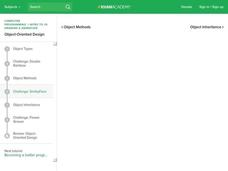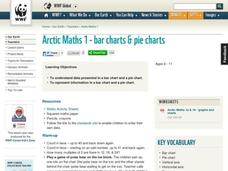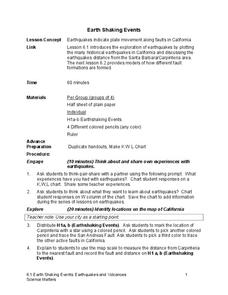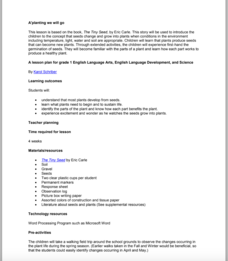Core Knowledge Foundation
Unit 5: Geology
Over four weeks, fourth graders participate in a geology-themed unit. Scholars listen to informational texts, discuss readings, and complete word work and grammar lessons. Writing practice includes drafting an informational pamphlet, a...
State of Victoria
Making Healthy Choices, Making Healthy Food: PreK-3 Curriculum Support
From examining how much sugar is in foods and looking at fruit and vegetable varieties to making mini rainbow tarts, this unit provides youngsters with a fabulous overview of proper nutrition and eating habits.
Scholastic
A Reading Guide to A Wrinkle in Time
Accompany a reading of Madeleine L'Engle's classic tale, A Wrinkle in Time, with a detailed guide equipped with 15 informative and useful chapters. Scholars discover who the author is, why she wrote the book, and crucial story elements...
Sargent Art
Protect Our Marine Life
Encourage water conservation and boost art skills with a hands-on activity that challenges young painters to create a scene highlighting marine life. Using oil pastels, scholars draw an underwater scene and write a tip for viewers to...
Khan Academy
Challenge: SmileyFace
Two smiley faces are better than one. The interactive lesson challenges pupils to use methods to alter a program to make it more efficient. Individuals use the new code to create multiple smiley faces that speak. The engaging activity is...
Washington Office of Superintendent of Public Instruction
Using Our Senses to Observe
Look around and explore. Little ones use their five senses with some day-to-day activities designed to guide observation and apply STEM strategies. Young scientists learn through comparing/contrasting and observing with magnifiers as...
August House
The Ogre Bully
English language arts, math, science, dramatic arts, and cooking; this lesson plan has it all! In this multidisciplinary resource, your scholars will take part in a read aloud of The Ogre Bully by A.B. Hoffmire and have a grand...
World Wildlife Fund
Bar Charts & Pie Charts
Learn about life in the Arctic while practicing how to graph and interpret data with this interdisciplinary lesson. Starting with a whole group data-gathering exercise, students are then given a worksheet on which they analyze and create...
Google
Art: Introduction and Discovery
Art isn't the first thing that comes to mind when thinking about computer science. The first installment of an eight-part Google CS Art unit introduces the series and highlights class procedures. Pupils view videos that show how to use...
Science Matters
Earth Shaking Events
The world's largest measured earthquake happened in 1960 in Chile, reaching a terrifying 9.5 magnitude on the Richter Scale. The second lesson in the 20-part series introduces earthquakes and fault lines. Scholars map where previous...
Serendip
A Scientific Investigation – What Types of Food Contain Starch and Protein?
You are what you eat, as they say! Are you more starch or more protein? Young scholars use their knowledge of each component to test different foods for their content. Using multiple indicators, individuals describe the protein and...
Curated OER
A'planting We will Go
Germination is an amazing process that results in amazing things. The book The Tiny Seed is the inspiration for a set of activities that will help build early literacy, observation, language, and writing skills. The class observes how...
Space Awareness
Oceans on the Rise
Temperature rises and land disappears! Through a lab exploration, learners understand the effect of temperature increase on water similar to the effect of global warming on our oceans. As they heat the water in a flask, they measure the...
NASA
Measuring Dark Energy
You're only 10 minutes late? Do you know how much the universe has expanded in those 10 minutes? Scholars graph supernovae based on their redshift and see if the results verify Hubble's Law. If it does confirm it, the universe is...
Science Friday
Microorganisms on the Move
You can't b. cereus until you see this lesson! Young microbiologists learn to prepare deep well slides, observe two types of microorganisms, and compare and contrast their physical characteristics in this interactive and lively activity.
Earth Day Network
Healthy Earth, Sick Earth
Earth is sick and needs our help! Read the children's book Planet Earth Gets Well to explain the various problems facing the planet, discussing what young conservationists can do to heal the planet along the way. A great Earth Day...
Pyro Innovations
Beach Exploration
Little ones will absolutely love this lesson. It's all about the beach and what they can find while sifting through the sand. A large bucket of sand filled with hidden items is brought into the classroom. Learners will discuss what kinds...
National Institute of Open Schooling
Atomic Structure
Learners explain historical findings such as Rutherford and Bohr's contributions, explain wave particle duality, and formulate Heinsenberg's uncertainty principle. They also draw s, p, and d orbitals, explain more historical findings,...
Columbus City Schools
Experiencing Eclipses
Don't be caught in the dark! Young scientists investigate the causes of both solar and lunar eclipses using an interactive to help them understand the development of an eclipse over time. They then research facts and characteristics of...
New Mexico State University
Lab 6: Kepler's Laws
A 15-page package thoroughly teaches your physics or astronomy learners about Kepler's three laws of planetary motion. Each one is stated and explained. Class members answer questions, solve problems, and participate in the classic...
It's About Time
Making Waves
Young scientists use Slinkys to better understand waves. After creating and measuring many aspects of waves, they complete a handout and homework questions. The resource also introduces the final project for the chapter, though it does...
It's About Time
Elements and Their Properties
How did ancient scientists classify elements? Answer this question and others as young chemists create a device to test the properties of various elements. They classify elements as metals or nonmetals, learn to differentiate between...
Cornell University
Constructing and Visualizing Topographic Profiles
Militaries throughout history have used topography information to plan strategies, yet many pupils today don't understand it. Scholars use Legos and a contour gauge to understand how to construct and visualize topographic profiles. This...
LABScI
Acids and Bases: Cabbage Juice pH Indicator
Explore the range of pH using an assortment of household liquids. Scholars create their own pH indicators from cabbage and determine the pH of several liquids. To further their exploration, individuals use the same liquids to create...
Other popular searches
- Life Science Experiments
- Egg Science Experiments
- Hands on Science Experiments
- Space Science Experiments
- Food Science Experiments
- 5 Minute Science Experiments
- Simple Science Experiments
- Air Science Experiments
- Fun Science Experiments
- Earth Science Experiments
- Science Experiments Units
- Sea Life Science Experiments

























